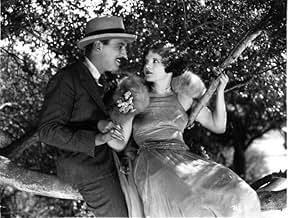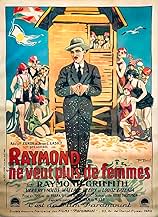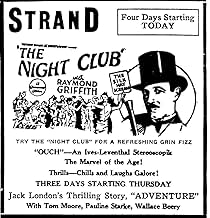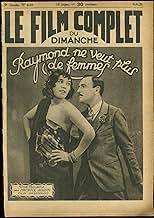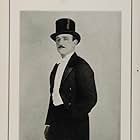This is now the second film I've seen (after "Paths to Paradise") starring Raymond Griffith, the talented comedian who was popular in the 1920s but who has now been largely forgotten due to the loss and unavailability of many of his films. As with the previous film, I was highly impressed.
Griffith was known as the "Silk Hat Comedian," though here he only dons it for the scenes where, appropriately, he is getting married (for the rest his is dressed nattily but in street clothes). This comedy is an out-and-out farce, with a plot that is humorously convoluted (Raymond has been stood up at the altar, so he renounces women just before he finds out that he has been left a fortune on the condition that he marry; he nonetheless goes abroad in search of escape from women, but ends up in the same town as his arranged bride), but develops smoothly and with great comic timing. It revels unashamedly in impossible coincidences, and laughs are drawn deliberately out of our reactions to one unlikely development after another. The "night club" of the title -- which apparently is a particular society allowing only confirmed bachelors -- is oddly mentioned in only one title card and then dropped; perhaps there existed more complete prints of this film that brought it in more.
A big part of Griffith's success in comedy seems to come from his natural expressiveness as an actor; he can do a huge amount with his face and body and play it in a serio-comic way that works perfectly for this kind of story. Even with all the complications, the plot proceeds in a clear line with a protagonist we can follow. That allows the broader gags (dozens of girls emerge into the hall as Raymond calls for his butler Gerley) to be all the funnier as they are integrated in seamlessly.
As much of "Paths to Paradise" revolved around variations on two people trying to steal the same jewels, much of the best comedy here derives from a hilarious black-comedy sequences in which Griffith, who now must convince his new love that he does not really want her only for the money he could inherit, makes several vain attempts to kill himself, each of which ends in the girl deriding it as a foolish ploy for attention. There's a wonderful escalating brilliance to the series of gags in which he is constantly foiled in his suicide attempts -- pulling down the chandelier in an attempted hanging, and ending up an another woman's arms in front of the girl he wants as he tried to make a bandit jealous enough to murder him.
By some miraculous quality, this film manages to retain a certain kind of deadpan believability even as it turns on some totally unbelievable points -- Griffith somehow sells credibly his quick decisions to renounce women, to un-renounce them, to kill himself, and not to kill himself -- and the humor and involvement come not just from the story and gags but from investment in character and his earnest, offbeat, desperate, and ever-polite attempts to extricate himself from his predicaments. A running gag where new developments cause Raymond continually to order his butler to move his things in and out of his hotel in preparation for moving or staying is highly funny and used just enough to keep it that way rather making it repetitious.
Griffith seems to have been able to impart that same deliberate emphasis and comic timing here to what could have been an unrestrained farce as to what could have been an average caper film. It's hilarious, and plays madcap events in an otherwise low-key way for a memorable effect. It takes what could have been countless unbelievable events and character choices and makes them acceptable while at the same time reveling in their exaggerated unlikeliness. I'm looking forward to seeing what more I can of Raymond Griffith's comedies, and more disappointed than before at the number of them which are presumed lost.


